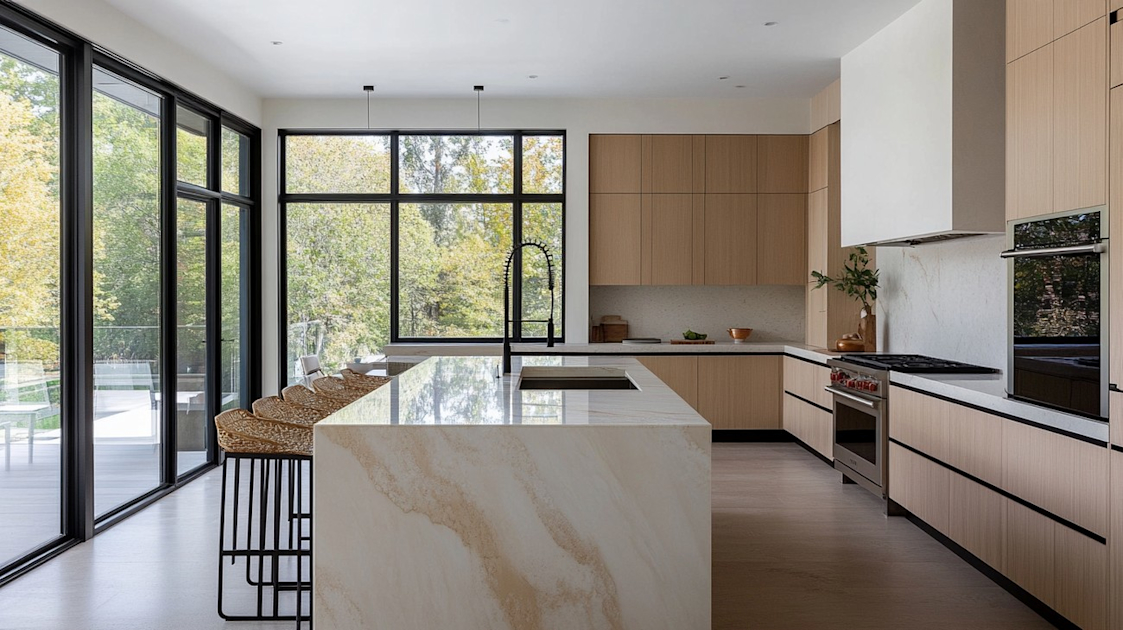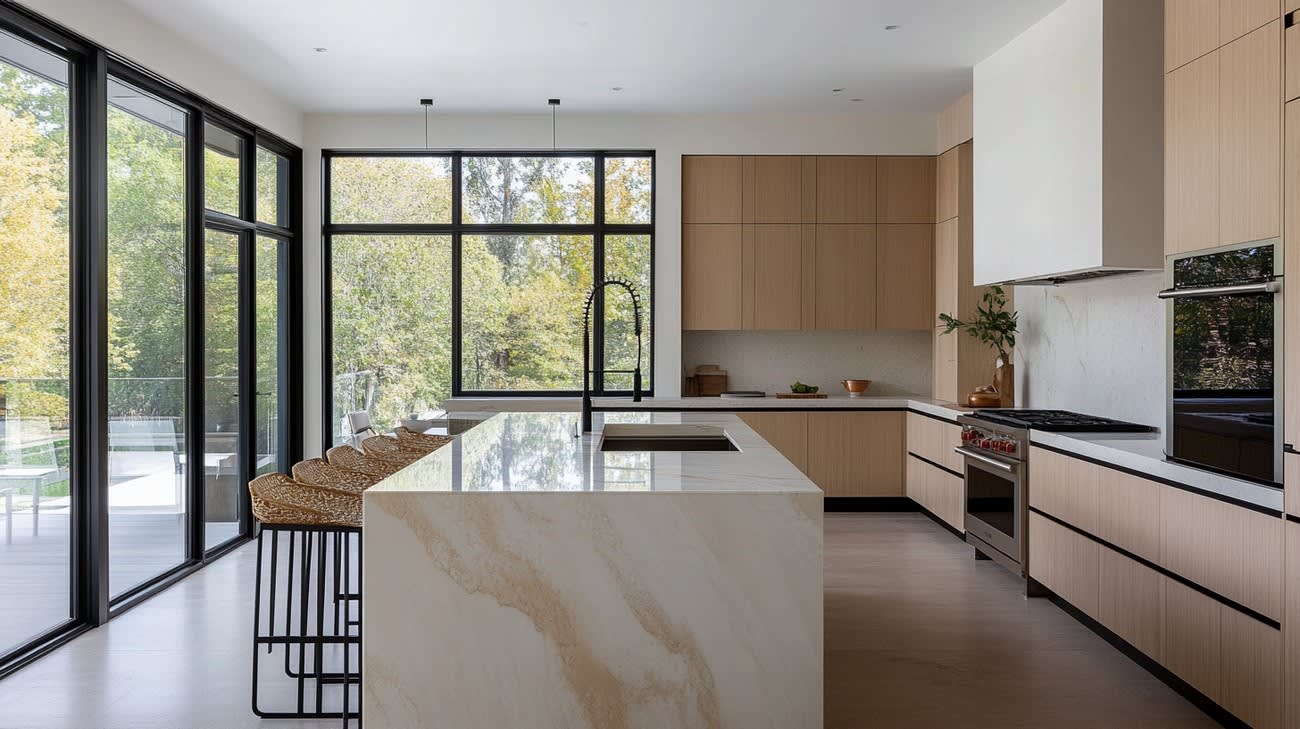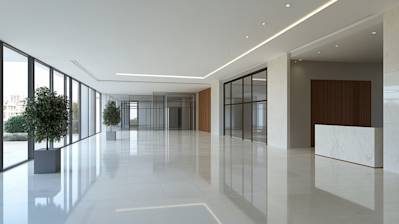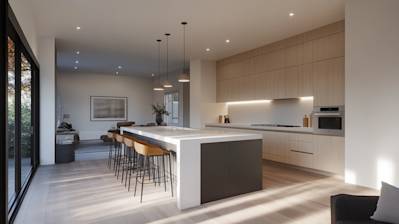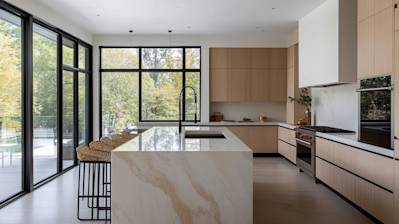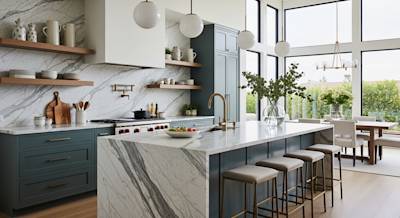When you start the journey to redesign your kitchen or bathroom, one of the influential decisions you'll make is choosing your countertop. Natural stones and engineered stones are the two primary material types for countertops. Quartzite and Quartz are two popular options that possess their unique charm, durability, and functionalities. Those embarking upon a home renovation often find themselves caught in the debate -- quartzite vs. quartz. This blog post aims to demystify these two materials, comparing and contrasting them to help you make the right choice for your countertops.
What is Quartzite?
Quartzite is a naturally occurring metamorphic rock. It begins its journey as sand grains, usually quartz, in sedimentary rock. The transformation into quartzite happens when the sand grains are compacted and heated, resulting in a dense, hard rock that is extremely resistant to heat and wear.
Quartzite is famous for its marvellous look -- a luxurious, glossy surface with stunning patterns. Its beauty, coupled with its impressive durability, is perhaps why homeowners often get attracted to this natural stone for their countertop choices.
Remarkable Features of Quartzite
Quartzite offers several striking features:
- High resistance to heat and scratches
- Luxurious look with glossy surface and impressive patterns
- Long-lasting durability
- Variety of unique hues as it undergoes the natural coloration process
However, keep in mind that quartzite requires an appropriate sealant for better stain resistance as it is porous by nature.
What is Quartz?
Unlike quartzite, quartz is not a natural stone. It is an engineered material made from crushed quartz, resin, and pigments. Approximately 90-95% of a quartz countertop is composed of crushed quartz mixed with resins to create a very hard and durable material.
Quartz countertops are also in high demand due to their resilience, low maintenance, and versatility in design. The manipulation of quartz allows for a wide range of hues, patterns, and finishes.
Noteworthy Features of Quartz
Quartz countertops exhibit a diverse array of notable features:
- High durability, comparable to that of quartzite
- Low maintenance – they don't require sealant
- Versatility in design and color due to the manipulation process
- Non-porous, making them highly resistant to stains and bacterial growth
Differences between Quartzite and Quartz: Key Points
When embarking on quartzite vs. quartz exploration, understanding the key differences between these materials can be an asset.
- Origin: Quartzite comes from Mother Nature, originating as sandstone which turns into quartzite. On the other hand, quartz is man-made, composed of crushed quartz, resin, and pigments.
- Variety: If you're more inclined towards unique, natural patterns, quartzite is your go-to option. Quartz, however, comes in a wider array of colors thanks to its making process, making it perfect for custom themes.
- Maintenance: Quartzite, being porous, demands a sealant to resist stains and acid attacks from food. Quartz requires meager maintenance as it's non-porous and sturdier against staining.
- Durability: Both materials rank high on the Mohs hardness scale, with quartzite being slightly more scratch and heat resistant than quartz.
- Cost: On average, quartz counters are relatively less costly as compared to quartzite.
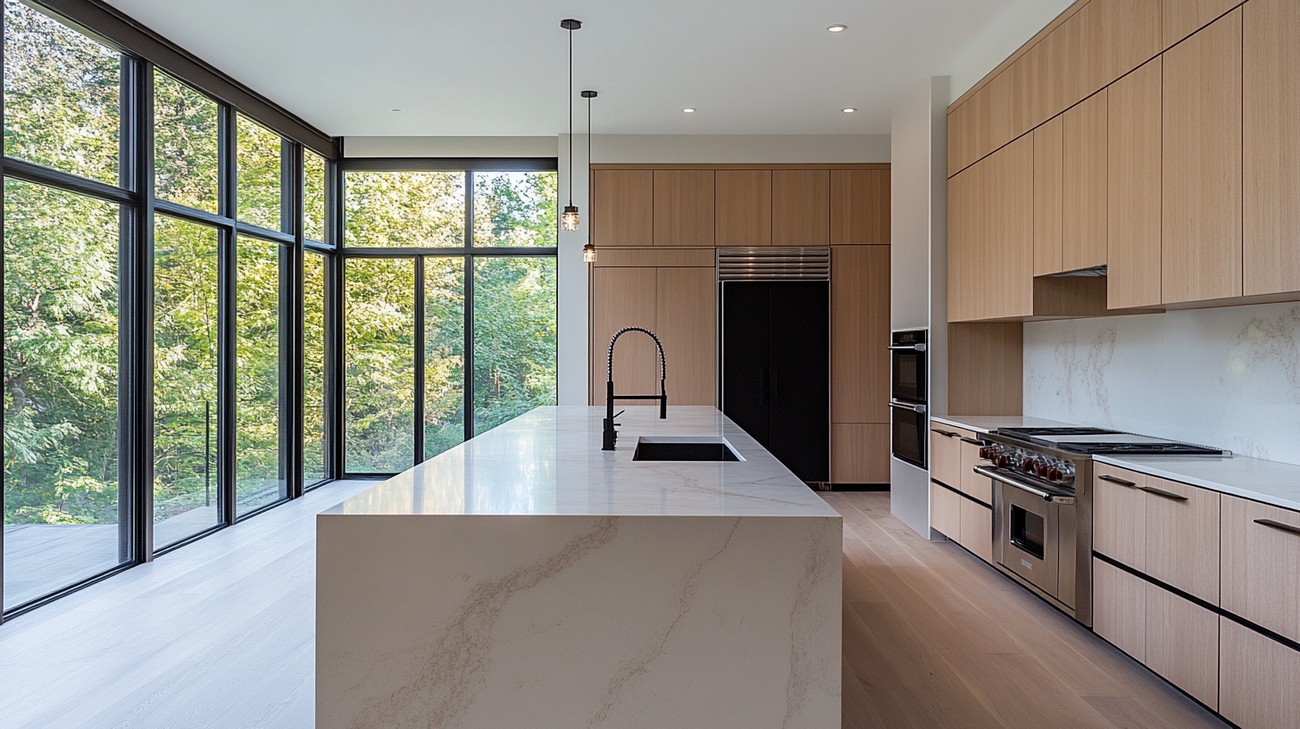
Frequently Asked Questions about Quartzite Vs Quartz
How is quartz different from quartzite?
Quartz, also known as engineered quartz, is quite different from quartzite even though their names might suggest they're the same. Quartz is a synthetic material made from around 90-95% ground quartz mineral combined with resins, polymers, and pigments. This results in a very durable, non-porous, and stain-resistant material that requires less maintenance compared to natural stones. It also comes in a wide variety of colors and patterns.
How does quartzite compare to quartz in terms of durability?
Both quartzite and quartz are considered highly durable due to their strong physical properties. However, these materials have different types of durability. Quartzite is resistant to heat and scratches, making it a great choice for kitchen countertops and other high-traffic areas. On the other hand, quartz is more resistant to stains and corrosion, thanks to its non-porous nature.
Is quartzite as non-porous as quartz?
No, quartzite is not as non-porous as quartz. Despite its hard and durable nature, quartzite is a natural stone and tends to have microscopic pores and channels. This makes it more prone to staining than quartz. However, a high-quality sealer can mitigate this issue by adding an extra layer of stain protection to the surface of quartzite.
Is quartz cheaper than quartzite?
Typically, the cost between these two materials can vary depending on various factors including quality, design, and installation requirements. However, quartz is generally less expensive than quartzite when it comes to material and installation costs. Quartzite, being a rare and naturally occurring stone, often comes with a higher price tag, but provides a unique and luxurious appearance that many homeowners find worth the expense.
Which is easier to maintain, quartz or quartzite?
In terms of maintenance, quartz is often considered easier than quartzite. Quartz doesn't require any sealing and practically immune to staining. Routine cleaning with mild soap and warm water is usually enough to maintain its luster. On the other hand, quartzite requires regular sealing to protect it from stains and moisture.
Can Quartzite and Quartz be used for the same purposes in home construction?
Yes, both quartzite and quartz are commonly used for kitchen countertops, bathroom vanity tops, backsplashes, and floor tiles. Each offers its unique combination of beauty, toughness, and durability. While quartz can offer a more uniform look and color, quartzite is often chosen for its unique patterns and natural aesthetics.
Is quartzite more natural than quartz?
Yes, from an origin standpoint, quartzite is indeed more natural than quartz. Quartzite is a naturally occurring stone extracted straight from the earth. Quartz, however, is engineered using ground quartz mineral combined with resins and pigments.

Pros of Quartzite
Durability
High Heat Resistance
Quartzite is formed through the intense heat and pressure of metamorphic processes, making it extraordinarily heat resistant. This is a notable advantage for applications in high-temperature areas like kitchen countertops where hot pans and cookware might need to be placed directly on the surface.
Strong and Hard
Considered one of the harder natural materials, quartzite is less prone to scratches, chips, or other forms of wear and tear. This inherent hardness makes it a much more durable choice in high-traffic areas compared to other material choices.
Aesthetic Appeal
Unique and Natural Stone
Unlike quartz, every slab of quartzite is unique with its varying veining and color patterns. If you're looking for a distinctive and natural look, quartzite is a great choice.
Versatility
Quartzite slabs come in various shades and patterns which make it versatile for different interior designs. Its wide range of colors from light to dark can blend seamlessly with any color scheme.
Cons of Quartzite
Maintenance
Requires Regular Sealing
Quartzite tends to be porous, which means it can soak up liquids and stains if it's not properly and regularly sealed. This periodic sealing requirement increases it's overall maintenance compared to quartz.
Can be Etched
Although quartzite is a tough stone, it can still be etched, particularly by acidic substances. This could mar its beautiful surface over time.
Cost
More Expensive
Quartzite typically costs more than quartz, both in terms of the material itself and installation costs. The premium price is because of its natural beauty and strength.
Pros of Quartz
Durability
Less Prone to Staining
Quartz is non-porous and doesn't require any sealing, which means it's less likely to stain than quartzite. This is a big advantage if your counter or surface will regularly be exposed to staining substances like coffee or wine.
Scratch Resistance
Quartz is also very hard and scratch-resistant, making it suitable for high-traffic areas where the surface may risk regular scuffing and scratching.
Maintenance
Easy to Clean
Because quartz is non-porous and non-absorbent, it's incredibly easy to clean. Simply wiping down the surface with a damp cloth is usually enough to maintain its sleek appearance.
Design
Consistent Pattern
Since quartz is a man-made material, its pattern is more consistent than the one found in natural stones, like quartzite. This consistency can aid in achieving a more uniform look.
Cons of Quartz
Aesthetics
Not As Unique
Because quartz is a man-made material, it won't have the unique veining and natural look that a material like quartzite has. However, this can be a pro or con depending on your personal aesthetic preferences.
Durability
Less Heat Resistant
Compared to quartzite, quartz is less resistant to heat. Exposure to high temperatures can cause it to discolor or even crack.
Environment
Not Environmentally Friendly
The process of making quartz countertops isn't very environmentally friendly. Energy is used to crush and combine the quartz with resins, which can release volatile organic compounds (VOCs) into the air.
Cost
Can be Expensive
While often cheaper than quartzite, quartz still runs on the more expensive side when compared to other countertop materials, this could be a con for budget-conscious homeowners.
Edge or Corner Damage
Quartz's edges and corners can chip, particularly if they are struck hard. Repairing these chips is not always straightforward and can require hiring a professional, adding to the overall cost of the countertop over its lifetime.

Myths and Misconceptions about Quartzite and Quartz
Much of the confusion around quartzite and quartz emerges from misconceptions and misinformation. To clear up these misunderstandings and myths, we delve deeper beneath the surface.
Origin and Formation Myths
Quartzite is Man-made
One common myth about quartzite is that it's a man-made substance, similar to quartz. Quartzite is, in fact, a natural stone. It is formed from sandstone and quartz under intense heat and pressure over millions of years. The metamorphic process in the earth's crust results in a hard and durable stone that often presents with stunning veining patterns.
Quartz is a Purely Natural Stone
Unlike quartzite, quartz is not 100% a natural stone. It's a man-made, engineered stone made from roughly 90% ground quartz minerals combined with approximately 10% resins, pigments, and other materials. This composite nature allows for a vast array of colors and patterns in quartz countertops, unlike natural stones which have more limited color options.
Property Related Myths
Quartzite is Softer than Quartz
Often people assume that because quartzite is a natural stone, it's softer or less durable than man-made quartz. On the Mohs hardness scale (a standard for measuring the hardness of materials), quartzite measures 7, equalling quartz's hardness rating. Quartzite's density and toughness make it incredibly resistant to scratching or cracking.
Quartz is Resistant to Heat and Sunlight
While quartz counters are durable and scratch-resistant, they are not as resistant to heat or prolonged exposure to sunlight compared to quartzite. Placing hot pots directly on quartz surfaces can cause damage, and the color of quartz countertops can fade over time if they're near a window with direct sunlight.
Maintenance related Myths
Quartzite Requires No Maintenance
Natural stones, including quartzite, are somewhat porous. Quartzite might need to be sealed periodically to avoid staining. It's crucial to quickly clean up spills on quartzite countertops to prevent them from seeping into the stone.
Quartz Maintenance is Laborious
This misconception arises from the fact that the quartz is man-made. However, thanks to the polymer resins it's made with, quartz countertops are non-porous and stain-resistant. Simple cleaning with soap and water is typically sufficient. However, quartz counters should not be cleaned with abrasive cleaners, which can damage the surface.
Appearance related Myths
Quartzite has Uniform Patterns and Colors
Quartzite is a gloriously diverse material. Each batch of quartzite can vary widely in color and patterns, depending on the specific conditions and minerals present during its formation. This contrast creates unique and beautiful variations in the stone but can also make it difficult to maintain uniformity across larger projects.
Quartz Lacks Style and Aesthetic Appeal
Quartz countertops are available in various colors and designs to simulate the look of high-end materials like marble and granite. There's a wide range of modern, sleek quartz countertops available on the market. The resin in quartz countertops allows designers to create countertops in any color, ranging from natural looking patterns, vibrant monochromatic themes, to the incorporation of flecks of recycled glass for a more eclectic look, which broadens the design possibilities.
Cost related Myths
Quartzite is More Expensive than Quartz
Quartzite and quartz prices can sometimes end up being comparable, depending on the quality, quantity, and where you purchase it from. High-quality quartz can command similar prices to natural quartzite.
Quartz is Cheaper because it’s Man-made
The production process for quartz can be costly, factoring in the quality of quartz mineral used, the intricacy of the design, and the manufacturing process. So, while some basic quartz designs can be relatively cheap, more luxury versions can be as expensive or even more costly than several natural stones.
Environmental Impact Myths
Quartzite is More Eco-friendly than Quartz
Both materials have environmental considerations. Quartzite, being natural, doesn't require chemicals or energy-intensive processes to manufacture, unlike quartz. However, quartzite's extraction from quarries involves drastic landscape changes.
Quartz has No Eco-impact
Man-made quartz are not as eco-friendly as they seem. The manufacturing process uses energy and produces carbon emissions. Some quartz options do use high quantities of recycled materials, but it's necessary to offset this environmental impact against the extraction and processing.
These are just some of the myths and misconceptions surrounding quartzite and quartz. As with any design material, understanding the qualities, advantages, and limitations of both stones helps make informed decisions. Both offer distinct features with their unique aesthetics, durability, and maintenance requirements, and it's essential to choose the one that best suits your lifestyle, taste, and budget.
Summary
The comparison of quartzite vs quartz really depends on what you specifically need in a countertop material. Clear and simple, quartzite is a strong and durable natural stone, boasting fantastic heat resistance and a classic, natural look. But, you’ve got to maintain it. On the other hand, quartz countertops, which are engineered from crushed quartz and resin, offer a wider variety of colors and textures, an equally durable finish, and require less maintenance.
So really, the choice boils down to personal taste and your willingness to put in the upkeep. If you love the look of quartzite’s unique and natural styles, and don't mind the occasional resealing maintenance, go for it! If you'd rather skip the extra care, want more color options, or are just a fan of the sleek, consistent look of quartz countertops, quartz is your choice.
In the end, both quartzite and quartz offer their own unique set of features and benefits. It all comes down to your individual preferences, lifestyle, and budget. Both materials are durable, eye-catching choices that will last for years. So, when it comes to quartzite vs quartz, there's really no wrong answer, only what's right for you!
About GoodLife Home Renovations
GoodLife Home Renovations is a trusted name in the home remodeling business, proudly serving Springfield, MO, and the surrounding areas. With a well-earned reputation for top-notch craftsmanship and unparalleled customer service, we're absolutely committed to turning your house into the home of your dreams. Whether you've got a kitchen that needs updating or a basement that's begging to be finished, our expert team has the experience and skills to bring your renovation visions to life. At GoodLife, we understand that your house is more than a property - it's where life happens, and we consider it an honor to help you make it the perfect place for all your living needs. With us, you can transform your living space into a haven that exudes comfort, functionality, and style. Who said you can't have the good life living at home? With GoodLife Home Renovations, it's all possible.

